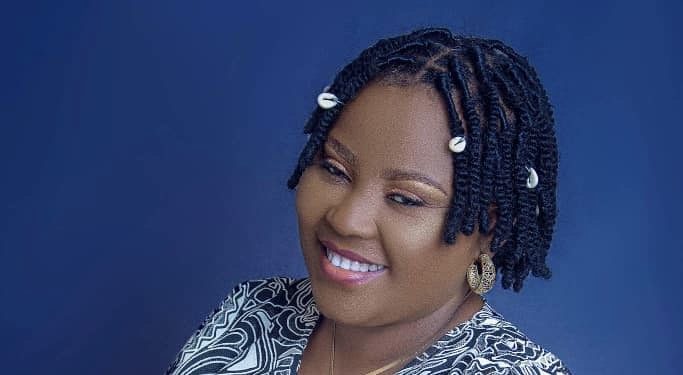Bukola Fakunle: From Deafness to Defiance, a Feminist Voice for Disability and Gender Rights

Our featured champion comes with an amiable and disagreeable personality as it gets. Bukola Fakunle (alias MFE) is a local legend of sorts within the Nigerian Deaf community – a strong feminist voice. She holds a degree in Yoruba language and runs a fashion outfit. A veteran of many hard battles around disability and its causes, Bukola still bears the scars – but now without the scares. Her many battlefront encounters had transformed this formerly timid rearguard into a fearless frontliner for disability and gender rights.
Coming from several fireside chats and a one on one interview, in this 22nd of the series, Bukola’s shares her lived experience of stooping to conquer.
Background and growing up
She is known as MFE, (Mama Fakunle-Eleshin) within the Deaf community. Born and brought up in Ibadan. Her dad, a clergyman with strong intellectual leanings is best described in one word – “enigma”. Mother, a barely literate peasant, compensated her deficit in schooling with staggering amounts of native intelligence.
Coming from a polygamous background meant a rowdy growing up. Still, the young Bukola held her own in that large home. She was just in primary two when she joined the choir in her dad’s church. She loves singing the old Yoruba hymns till date.
Beautiful memories of childhood in the years before deafness
“I didn’t do books or reading – they were a bore. My learning style was peculiar. I simply improvised what we were taught into songs which I memorized and sang. During examinations, I hummed out my answers in writing from those improvised songs playing out in my head. One time I was asked to repeat an announcement before the pupils during closing time, I recited it in song, the school band took it up and the whole school joined in a dance – that day, the pupils left for their homes singing. I sang all the way home and, on arrival created a scene,”
Bang! A slap translates to deafness
It happened in one fleeting moment of uncontrolled rage – a loud slap to the ear, and that was the beginning of deafness for the young girl.
She recalls:
“For about five minutes after that slap, everywhere was silent.”
After the five minutes of silence elapsed, the young girl regained sound. But now the ability to readily decipher speech was permanently impaired. Deafness crept in subtly. The first hazy realization was when she could no longer eavesdrop on conversations.
Bukola was eleven or thereabouts – living with an older sister and her husband. One day, tragedy struck – the couple lost their second child, a baby boy whom the family, including neighbors doted on. It was in the aftermath of that loss that she received the slap from her sister’s husband. It’s still unclear why the assailant chose to take out grief over the loss of a son on an innocent eleven year old with such brutality. However, the following recall by Bukola gives a chance at an educated guess:
“Prior to the slap incident, whenever her husband’s siblings came visiting, she (my sister) often asked me to sneak into an adjacent room from where I could eavesdrop on conversations in the living room. Until that bang on my ear, I did a good job of a secret informant, but after the slap I found I could no longer make out the words of the conversation – just unintelligible sounds. When I told my sister, I only got more beatings and was sent back to eavesdrop. I resorted to cooking up stories.”
The abuse in that home continued and, at the height of it the young girl left for her dad’s house. It was back among family that it became obvious beyond doubts that her hearing had been tampered.
Gan dii!
Bukola recalls she was in her first year of junior high school when she lost her hearing. It was hell pushing through school during that time. She repeated classes in year one and two. Having lost touch with the connective power of voiced communication around her, Bukola gradually cocooned into her own world. In class, she gave widely off point responses to questions – becoming the butt of jokes and earning different monikers.
“There was a day one of my teachers stood me before the whole class for caning. I was to receive the strokes on my backside – I froze with fright as the strokes landed. The way I held out my backside earned me the nickname ‘Gan ‘di ‘, – roughly translates as ‘stiff buttocks’.
Decline and drop out
Deafness brought a sharp drop in academic performance as Bukola could no longer sustain her original style of learning by improvising songs from information heard. She gradually adapted to reading. But the farther she drifted into books, the more she lost friends. Repeating classes while her erstwhile classmates progressed only worsened matters.
The enormity of navigating the challenges of deafness in a conventional school – with no genuine support system, took a huge toll on the now adolescent girl’s self-esteem and confidence. She eventually wound up in an inner circle of six friends (the few who seemed to understand her) where she found some measure of solidarity to weather the storm. This clique of six friends defended each other’s interests. By this time she had managed to pull through the first year of senior high school and was about progressing to second year. Then something happened that led to Bukola dropping out of school.
She recalls the incident that triggered the drop out:
“I stepped into school that morning donning a Shooting Stars football club (IICC) faze cap. The IICC was the rave of the Nigerian football league at that time and the week before had engaged a rival club in a high tension match. That day, a group of teachers were gathered discussing the outcome of the match. On sighting me, shouts of IICC rent the air (I found out later). The hailers apparently hoped to get my response and my silence looked like an effrontery. There was this particular teacher – the dread of all the students and was never seen without a cane. He called for me…as I approached trembling, wondering what my offence was, one among the teachers who knew about my deafness saved the situation. During the pen and paper communication that ensued, the teachers queried about my deafness. They were astonished at my command of written English – finding it hard to reconcile with the claims of deafness.”
After that incident, Bukola’s dad was invited for recommendations on her case. It was recommended that she be transferred to a school for the Deaf. Unfortunately, her father (out of ignorance) declined, and Bukola ended up staying at home – her education stalled for years.
The years at home
For the years she stayed at home, Bukola became the errand girl and workhorse of family and neighbors. She did the laundry, babysat for nursing mothers, and many more. She was always available and willing to help. When she wasn’t working, she would find solace on the pages of books. Bukola still holds fond memories of the people and books that sowed the seeds of the personality she would evolve into – Barbara Taylor Bradford’s “A Woman of Substance”, Joyce Meyer’s “The Confident Woman”, and Tuesday Lobsang Rampa’s “Third Eye”.
But as the years rolled by (and more so as she watched her siblings daily leave for school and return) she struggled with a growing discontent for a more meaningful existence. The idea of learning a trade was suggested and Bukola opted for fashion designing. She did well at it and years down the road that skill would come in most handy.
Still, learning a trade didn’t end her inner dissatisfaction. Frustrated by the constant frictions and tensions at home, one day she walked out. But that decision backfired as it exposed her to more abuse among relatives she moved in with. Those were years of disorientation.
Stooping to conquer – coming into terms with Deafness
For Bukola, it was a long road to finally acquiescing with disability. Coming from a background that emphasized the restoration of her hearing, weaning off the cure-seeking mindset was a herculean task. Despite several failed attempts at restoring her hearing during those out of school years, that mindset lingered.
The first, definitive step to acceptance was re-enrolling in a school for the Deaf where she started from SS2. There, beyond completing her secondary education and obtaining a Senior School Certificate requisite for further studies, she was exposed to Deaf people and their language – a big step towards rehabilitation. Reminiscing on that phase of life, Bukola says:
“At the school for the Deaf, I wept at the realization of how far I would have gone had my dad had heeded the advice to take this step years back. It hurt to think of the long years wasted at home in fruitless searches for cure. At the time I was brought here as a student, I was in my early 30s, I had to wear the school uniform just like every other student. Meanwhile, many of the teachers were my age mates.”
But she knew what she wanted and endured the process. It was a classic case of Oliver Goldsmith’s 18th century play of the title: “She stoops to conquer”. That wasn’t the only time Bukola had to stoop to conquer. She seemed to have that ability down to an art.
From that first Deaf connection at the school, Bukola migrated into the larger Deaf community. Things moved fast. It was in this dynamic community that she got a deeper grasp on sign language and met Deaf individuals whose influence helped her reach acceptance and come into her own.
In a few years of immersing in Deaf world, she reached the point of “no more shame, no more fear”.
As she puts it: “No one was going to confuse my life again, when someone brings trouble to me I give it back.”
Discrimination and coping strategies.
Having been toughened by her many battles, Bukola says she’s much better able to take discrimination in stride.
“I have come to the understanding that people discriminate because of ignorance. Most times, I simply ignore it… But seeing others discriminated against brings out my fighting side. That’s when I don’t hesitate to give serious tongue-lashings, and (if needed) some stern lectures to the perpetrators.”
In God’s economy, we’re vital
There are ways in which a disability builds character and Bukola says deafness has helped grow her patience, focus, creativity, and the ability to set and achieve goals.
Favorite quotes: “Do to others as you want them to do to you” and “Never be tired of doing good”.
She advises the younger generation of PWDs to: “Know what you want – and go for it!
And to a society that discriminates against persons with disabilities, she cautions:
“Disability writes no letter when it is coming. Put yourselves in our shoes. How would you want to be treated?”
As I round off the interview, I ask Bukola how she would answer the question “Is disability a bad thing?”
“No, disability is not a bad thing. The God who controls the universe has the power to avert any misfortune. For Him to allow any misfortune, He has a reason. It takes patience (a receptive and analytic mind to discover the reasons for one’s disability). Society sees it as a misfortune but not me. In God’s economy, we (persons with disabilities) are vital.”
She validates the last line with a reference to how much the disability sector contributes to gainful employment opportunities.
Editor’s note: This story was first published by BONews Service. This is a Disability Champions Series, a collaborative project with Madam Joy Bolarin, Executive Director, Jibore Foundation, is anchored by Alexander Ogheneruemu (Disability issues blogger).






